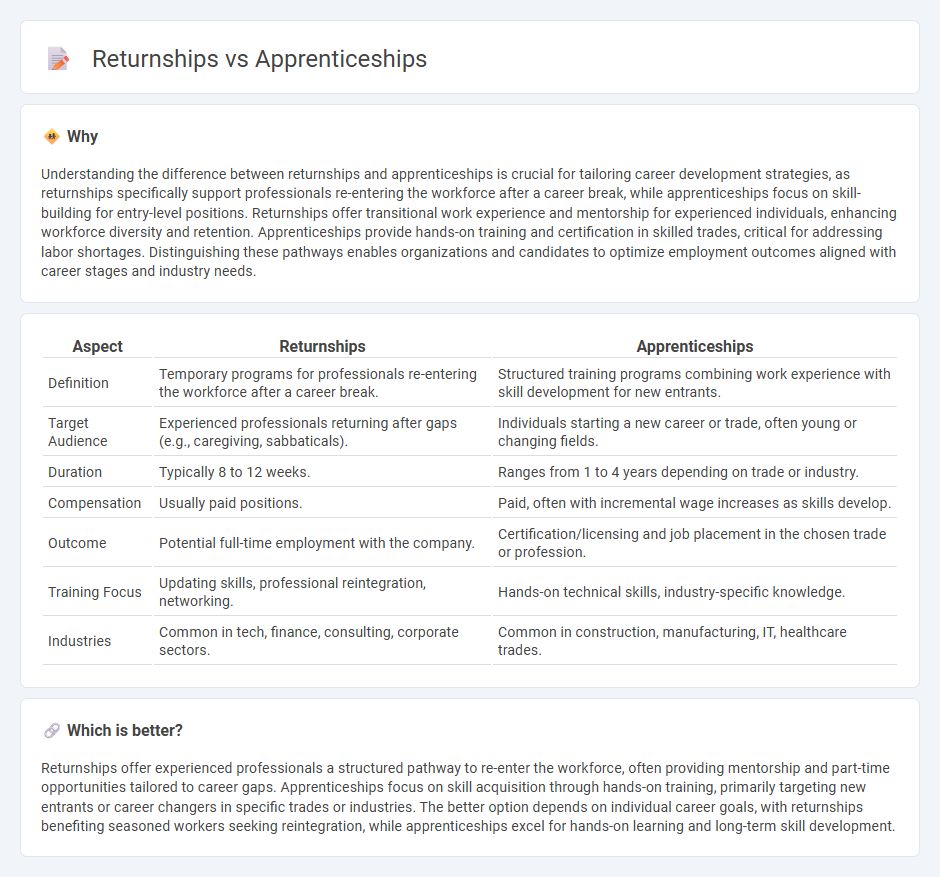
Returnships offer a tailored pathway for professionals reentering the workforce after a career break, focusing on skill refreshment and networking within their prior industry. Apprenticeships provide structured, hands-on training programs for individuals beginning new careers, emphasizing practical experience and credential attainment. Explore the distinct benefits of returnships and apprenticeships to determine the best fit for your employment goals.
Why it is important
Understanding the difference between returnships and apprenticeships is crucial for tailoring career development strategies, as returnships specifically support professionals re-entering the workforce after a career break, while apprenticeships focus on skill-building for entry-level positions. Returnships offer transitional work experience and mentorship for experienced individuals, enhancing workforce diversity and retention. Apprenticeships provide hands-on training and certification in skilled trades, critical for addressing labor shortages. Distinguishing these pathways enables organizations and candidates to optimize employment outcomes aligned with career stages and industry needs.
Comparison Table
| Aspect | Returnships | Apprenticeships |
|---|---|---|
| Definition | Temporary programs for professionals re-entering the workforce after a career break. | Structured training programs combining work experience with skill development for new entrants. |
| Target Audience | Experienced professionals returning after gaps (e.g., caregiving, sabbaticals). | Individuals starting a new career or trade, often young or changing fields. |
| Duration | Typically 8 to 12 weeks. | Ranges from 1 to 4 years depending on trade or industry. |
| Compensation | Usually paid positions. | Paid, often with incremental wage increases as skills develop. |
| Outcome | Potential full-time employment with the company. | Certification/licensing and job placement in the chosen trade or profession. |
| Training Focus | Updating skills, professional reintegration, networking. | Hands-on technical skills, industry-specific knowledge. |
| Industries | Common in tech, finance, consulting, corporate sectors. | Common in construction, manufacturing, IT, healthcare trades. |
Which is better?
Returnships offer experienced professionals a structured pathway to re-enter the workforce, often providing mentorship and part-time opportunities tailored to career gaps. Apprenticeships focus on skill acquisition through hands-on training, primarily targeting new entrants or career changers in specific trades or industries. The better option depends on individual career goals, with returnships benefiting seasoned workers seeking reintegration, while apprenticeships excel for hands-on learning and long-term skill development.
Connection
Returnships and apprenticeships both serve as structured pathways to re-enter or enter the workforce, offering practical experience and skill development for individuals at different career stages. Returnships typically target professionals resuming their careers after a break, while apprenticeships focus on individuals beginning their career journey, often providing on-the-job training combined with formal education. Both programs enhance employability by bridging gaps in experience and facilitating smoother transitions into sustained employment.
Key Terms
Training
Apprenticeships offer structured, hands-on training programs designed to develop skills in specific trades or professions over an extended period, often blending classroom instruction with practical work experience. Returnships provide targeted training and re-entry opportunities for professionals resuming their careers after a hiatus, emphasizing skill refreshment and industry updates. Explore detailed comparisons to understand which program best fits your career development needs.
Re-entry
Apprenticeships provide structured, hands-on training primarily for individuals entering a new profession, while returnships are designed specifically for professionals re-entering the workforce after a career break, offering temporary, paid positions to refresh skills and build confidence. Returnships emphasize flexible schedules and mentorship to support career re-entry, often targeting former caregivers or military personnel, whereas apprenticeships focus on skill acquisition for entry-level roles. Discover how these programs can uniquely support your career transition and re-entry goals.
Skill development
Apprenticeships provide structured, hands-on training typically targeting entry-level skill acquisition in various trades and professions, enabling participants to develop industry-specific competencies over an extended period. Returnships, designed for professionals re-entering the workforce after a career break, emphasize updating existing skills with practical experience and often include mentorship tailored to current market demands. Discover how these pathways maximize skill development by exploring their unique approaches and benefits.
Source and External Links
Apprenticeship & Training | Department of Labor and Industry - Apprenticeships are paid jobs combining on-the-job learning, classroom instruction, mentorship, and nationally recognized credentials, leading to strong career prospects and higher lifetime earnings.
Career Seekers - Apprenticeship.gov - Registered Apprenticeships offer paid employment, progressive wage increases, classroom and on-the-job training, and portable industry-recognized credentials to prepare individuals for high-demand careers.
Apprenticeship Directory - ApprenticeshipPHL - This directory lists paid Registered Apprenticeship Programs and Pre-Registered Apprenticeships focused on literacy and technical training, available in Southeastern Pennsylvania with credentials and possible college credit.
 dowidth.com
dowidth.com